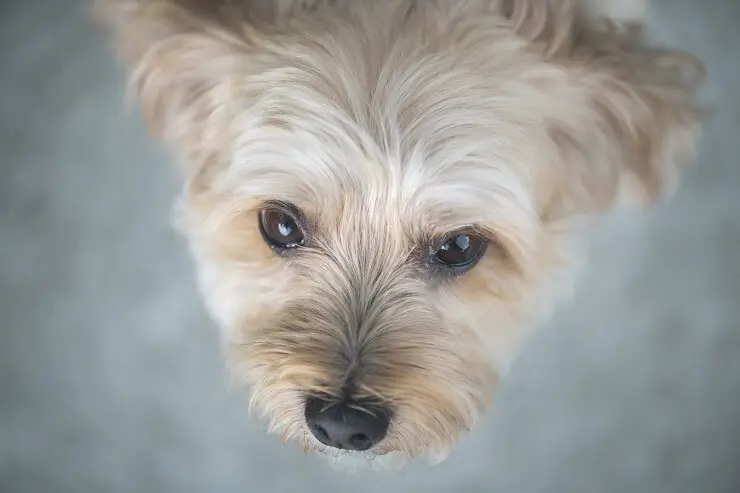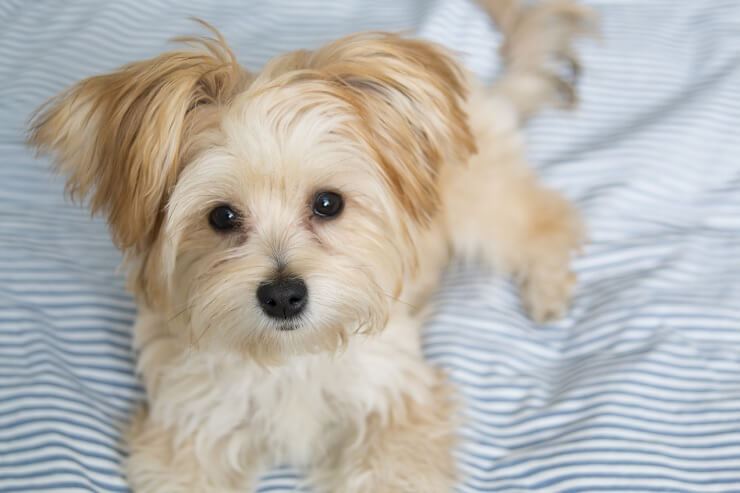The Morkie is an adorable designer dog breed that’s larger than life. Don’t let their miniature size fool you, these pooches are bursting with character.
They are hypoallergenic and only require a small amount of exercise to keep them healthy – they do love to play though!
Your pint-sized pup will be happy living in an apartment and doesn’t require a yard but their love for barking may make you unpopular with the neighbors.
They don’t do well being left alone and suit a home where they will be with someone for as much time as possible.
TABLE OF CONTENTS
What Is A Morkie?

From Adobe Stock
A Morkie is a cross between a purebred Yorkshire Terrier and a Maltese. They became popular in the US around 20 years ago. You may also hear them being called Morkshire Terriers or Malkis. These pups are prized for their friendly, outgoing nature and hypoallergenic coats.
Similar to their parents, these dogs are lap dogs.
The Yorkshire Terrier is well known for its confidence and a Maltese is also no wallflower. It’s not-surprising then that this gorgeous cross is full of personality and sass.
Their unpredictable appearance makes every litter of puppies an exciting lucky dip. Which characteristic will they inherit? It’s certain they will need plenty of grooming with that incredible coat and their need for attention should come as no surprise. What exact temperament and personality they develop is not so clear cut.
Morkie Appearance

From Adobe Stock
The tiny Morkie is definitely a petite pup.
They have a small, round face with a reasonable length muzzle. Their ears are covered in long fur and drop down. The neck and back are quite lean and lead into a tail with a slight curl. Their legs are thin and should be straight when you look at them from the front.
Its coat is gorgeous and attracts plenty of attention. They have long, thin hair that will easily grow to several inches in length. They’re a low-shedding dog which makes them hypoallergenic and great for people with allergies.
Most have the typical black and tan coloration of the Yorkshire Terrier. There are a few other varieties of coat color, including black, brown, tan and white. As there is no breed standard for these designer dogs, all appearances are loved equally among enthusiasts.
Height and Weight
You should expect a fully grown Morkie to stand at around 6 to 10 inches at the shoulder. At a healthy weight, they will be between 4-12lbs.
The shorter they are, the less they should weigh. Females are often at the lower end of the height and weight scales and males at the upper end.
Some are being bred with teacup Yorkshire terriers. This creates lots of health concerns due to their tiny size. The breeding of these dogs is not particularly ethical and we wouldn’t recommend purchasing a teacup dog.
Colors and Coat
The most commonly found color is the gorgeous black and tan coloration (from the Yorkshire Terrier parents). Puppies may also be black, brown, tan or white. The variation in coat color makes each pup look individual and unique. Fans of this breed love this about them.
Their coat is their prized possession, it is long and silky hair rather than the usual fur most dogs have. It’s incredibly low shedding and is considered hypoallergenic. It’s perfect for people with allergies or a particular dislike for dog fur.
If you’re allergic to most dogs, it’s always a good idea to spend some time with one before committing to buying one.
Morkie Personality and Temperament

From Adobe Stock
The Morkie is a mix of two wonderful breeds with many outstanding characteristics. Due to the unpredictability of mixed dog’s temperaments, the best way to understand their possible personality traits is to look at the parents.
Yorkshire Terriers are a feisty little dog. They are full of sass and love to be the center of attention. They are not all take though, Yorkies have a ton of love to give and don’t hold back. They make excellent watchdogs as they are alert and will bark to let you know if anything is happening.
The Maltese is a lively, intelligent and affectionate dog breed. They are incredibly trusting and have a fearlessness about them that you wouldn’t expect. These pups are impatient with loud children and don’t suit an excitable household.
Both dogs play well with other pups their size.
We say ‘their size’ not because they dislike bigger dogs but because they are easily injured by large dogs. The Morkie would enjoy having a companion. They even play well with other household animals and have been known to make friends with cats.
Having a furry friend would be useful when it comes to leaving them alone. These dogs hate to be left. Their separation anxiety makes them bark or howl when you leave – they will also chew up the furniture.
You should definitely expect barking from them. This is their way of communicating absolutely anything with you. If there’s a loud noise, if someone’s outside, if the bin is in a different place, you should expect to be told about it. This makes them great watch dogs but not great neighbors.
Although these little dogs don’t need much exercise, they love to play. Running around the house chasing a ball or other toys will be a great pastime for both of you.
You should expect your evenings to be full of cuddles and chill time as this pup lives up to its lapdog name.
Is A Morkie A Good Family Dog?
Morkies do extremely well in homes with older children who understand how to handle and behave around a small dog. They are not suited to homes with young children as they’re extremely delicate and can be easily damaged by tiny, inexperienced hands.
How To Train a Morkie
One thing that may be difficult about dog training is their stubborn streak. This little dog can be hard headed when it comes to training. The best way to work around this is to use lots of praise and treats when they behave how you want them to.
This is called positive reinforcement. Punishment is likely to be counterproductive to their training.
With any little dog, you should always be aware of small dog syndrome.
This is where a small dog is given special treatment that you wouldn’t give a larger dog and develops behavioral issues. These include jumping up, guarding behaviors and excessive barking. To ensure your pup doesn’t develop these issues, only allow them to do things that you’d allow larger dogs to do.
Socializing them from a young age is extremely important. You should introduce them to lot of different people to ensure they don’t become anxious. Having doggy play-mates is also an excellent form of socialization.
They are an intelligent breed (even with their stubborn streak). They will need mental stimulation throughout the day in the form of attention, training and games. Puzzle games are great for these dogs as it keeps them interested and occupied.
Caring For A Morkie

From Adobe Stock
Here is a dog best suited to a home where they will be the center of attention.
Individuals or couples are the best. They will be okay with teenagers but not younger children. They don’t need much exercise and are great for older people who aren’t able to offer long walks but have the time to dote on these adorable teddy bears.
Their grooming requirements are pretty high. This dog should really live with someone who takes pride in their pup’s appearance and enjoys the process of grooming.
Keeping your dog’s ears and eyes clean is important. Especially as Morkies are prone to the tear stains of their Maltese parents. You should also be brushing your dog’s teeth from a young age and making sure their nails are clipped too.
Exercise
The tiny Morkie doesn’t need much exercise. They are happy with 20-30 minutes of walking a day. Too much exercise is actually bad for these little dogs. It’s recommended to keep them on a leash when walking.
Some parks have specific small dog areas that are enclosed and only allow small breeds. This would be an excellent form of socialization and exercise for your pup. You should also arrange playdates with other small pup owners.
They adore chasing balls and love to play fetch.
Grooming and Shedding
Grooming is one area where this dog is high maintenance. Next to its need for attention, it’s probably its most demanding trait. That incredible coat needs daily brushing to tease out any tangles. They will also need bathing every month with dog shampoo – this will make sure their skin and coat stay healthy.
Trips to the groomers to cut their coat should happen every 6 to 8 weeks. When trimming your pup, make sure to keep the hair around the eyes and ears fairly short. Having short hair on the legs will also reduce the build-up of dirt from walks.
Groomers will often give these adorable little dogs the ‘teddy bear’ cut. This makes their faces seem particularly round and is extremely cute.
Feeding and Diet
As you would expect, Morkies do not need much food. Their appetite says otherwise. This little girl will happily munch through almost its own weight in food (not that you should let them). The best way to keep your pup on a healthy, controlled diet is to know exactly what they need.
A fully grown adult of around 4-8 lbs should eat around 200 to 300 calories a day. This should mainly consist of proteins and fats. Malteses are known to be quite picky eaters, so finding a diet that works for your dog might take some time.
As a puppy, they will need more calories, spread over more meals.
Using the food and feeding mix the breeder recommends is usually your best bet here. Once they’re older, they need to be moved onto an adult food blend. This is most often small dog kibble as this is best for their teeth.
Make sure to count any treats you’re giving in their daily calorie intake. It’s very easy to overfeed these tiny dogs.
Known Health Problems
With a small dog, you should always be careful. They may be easily damaged by big dogs, children, jumping off high places, being rolled on and a range of other hazards. They are fragile and should be treated with care.
With a little planning ahead you could get reimbursed for every vet bill from now on!
Most of the time, the Morkie is an incredibly healthy little dog. Some conditions that have been noted are mainly concerning their eyes – cataracts and glaucoma. Tracheal collapse and reverse sneezing have also been a concern.
The best way to ensure you have a healthy pup is to find a reputable breeder. This will ensure their parents are well bred and they have all the right vaccinations. Make sure to keep up with flea and worm treatments.
How Long Does A Morkie Live?
A healthy well cared for Morkie should live for 13-15 years. Some have been known to make it all the way up to 17 years!
How Much Does A Morkie Cost?
This tiny designer dog comes with a pretty large price tag. You should expect to pay around $1,500-$3,000 for a Morkie puppy from a respectable breeder. Due to their popularity, they have gathered some interest from puppy mills, so always be cautious if a puppy is underpriced.
Breed Summary Table
| Breed Characteristics | |
| Size: | 6-10 inches |
| Weight: | 4-12lbs |
| Lifespan: | 13-15 years |
| Coat: | Long and silky |
| Color: | Black and tan, black, tan, brown and white |
| Do They Shed: | Extremely low shedding and considered hypoallergenic |
| Temperament: | Friendly, outgoing, confident, sassy and stubborn |
| Intelligence: | Intelligent dog but might be hard headed |
| Socialization: | Loves other dogs and people |
| Destructive Behavior: | Excessive barking and chewing |
| People Skills: | Loves people and needs companionship |
| Good with Children: | Okay with older children but not great with younger children |
| Activity Levels: | Low activity levels |
Summary
The Morkie is most suited to people who are able to be with them for the majority of the day.
They are not active dogs and don’t need a ton of exercise, but they do need companionship. They also need plenty of grooming and this will take up some time each day (15-30 minutes).
This is a friendly, confident dog that is happy living in a relatively small space.
They adore attention and will want to be near you all the time. As long as you ensure you’re training them well, they will be a wonderful companion. You should expect many years of happy memories with them by your side.
More Maltese and Yorkshire Terrier Mixes
Want a Maltese mix or Yorkshire Terrier mix but aren’t keen on the Morkie? Check out these other hybrid dog breeds:









My morkie is exactly how you described. She’s a lap fog,full-on energy very hard headed and sassy. She acts like a big dog. She’s Tan and white with a beautiful coat. We love her very much. Her name is Maci.
We have a Morkie (Levi) and he’s my baby for sure. Thanks for all the info, he’s just like you said…and then some 🤣🙌🏽